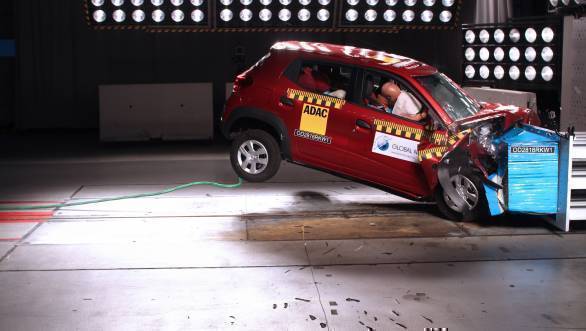Renault India Kwid scores one-star rating in latest Global NCAP crash test
In another round of crash tests conducted by Global NCAP, the India-made Renault Kwid disappointingly scored a one-star rating for adult occupancy. Meanwhile, the Honda Mobilio without airbags received zero stars while the variant with dual front airbags was awarded a three-star rating.
In a previous crash test conducted in May, the Kwid with a driver's side airbag scored no stars for adult occupancy. However, Renault had stated that it would make structural changes to the car before having it tested again. These changes along with the inclusion of front seatbelt pretentioners led to the marginal improvement in its safety rating. The Kwid with this improved body shell was rolled out into the Brazilian market as well as in India. It may also be noted that Renault has now started exporting the Kwid to Nepal.

The report states that while protection to the driver's head and neck were good thanks to the airbag, protection to the chest was poor due to high chest compression. Additionally, the report deemed the Kwid's bodyshell as unstable and unable to withstand any further loadings. David Ward, the secretary general of Global NCAP stated that the brand has "made limited progress" and that it should offer the driver's airbag and seatbelt pretentioner as a standard feature.
The Kwid's child safety rating isn't very encouraging either. It scored just one star with the report stating that the child seat for a three-year old was not able stop excessive forward movement during the impact which resulted in high biomechanical readings. Additionally, the static three-point seatbelts for rear passengers made installing a child restraint system easy.
The Honda Mobilio without airbags or seatbelt pretentioners offered poor head and chest protection. However, the bodyshell was rated as stable and capable of withstanding further loadings. Honda had then requested Global NCAP to test the variant with airbags to demonstrate the advantage of these systems. The results show that the head and neck protection for passengers was good, while chest protection was adequate.
Like Ward, Rohit Baluja, the president of the Institute of Road Traffic Education also stressed on the fact that automobile manufacturers in India should offer enhanced safety features as standard equipment.
The Indian Government recently stated that it is aiming to reduce road fatalities by 50 per cent in India by the year 2020. While plans include adopting smart mobility technologies, improving traffic and transport efficiency and environment friendly mobility, there has been no talk of adopting stricter safety norms for cars.
In January 2016, the Union Home minister, Rajnath Singh stated that airbags and ABS would be made mandatory in India soon. While that itself is a huge step for safety in Indian cars, the disappointing crash test results of the Kwid even with an airbag, go to show it is not enough to save lives. The Indian safety norms need to take into consideration factors like structural integrity and cabin design which play a crucial role saving lives. For example, the Honda Mobilio's safety rating went up from zero to three stars just by the addition of dual airbags. This is because the Mobilio features a better designed structure and a more stable body.
